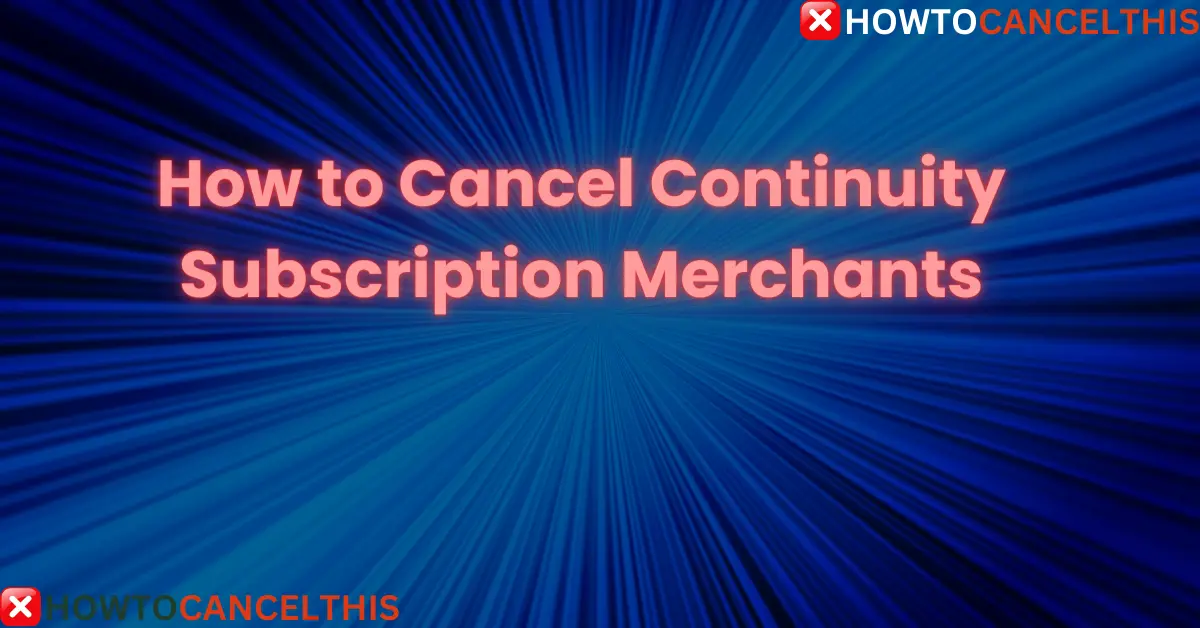Continuity subscription merchants offer a recurring billing model where customers are automatically charged at regular intervals for continuous access to products or services. This model is common in industries such as streaming services, software subscriptions, and meal delivery services. While these subscriptions provide convenience, they can also lead to unwanted charges if not managed properly. This comprehensive guide will help you understand how to effectively cancel continuity subscriptions, navigate common issues, and avoid unwanted charges.
What is Continuity Subscription Merchant?
A continuity subscription merchant is a business that offers products or services on a recurring billing model. Customers are charged at regular intervals (monthly, quarterly, annually) for continued access. This model is popular among businesses providing software, digital content, and subscription boxes. Continuity subscription merchants benefit from a steady revenue stream, while customers enjoy uninterrupted service.
Understanding Continuity Billing
A. How Continuity Billing Works
Continuity billing is characterized by automatic renewal and recurring charges. Customers are billed at regular intervals, ensuring uninterrupted access to the service or product. This setup benefits both merchants and customers by providing a predictable revenue stream for businesses and consistent service for users.
B. Common Issues with Continuity Subscriptions
Continuity subscriptions are often deemed high-risk due to frequent chargebacks and refunds. Customers may dispute charges for various reasons, such as not recognizing the transaction, being dissatisfied with the product or service, or finding it difficult to cancel the subscription. These disputes can result in financial losses and operational challenges for merchants.
C. Legal and Ethical Considerations
Merchants must adhere to regulatory requirements set by authorities like the Federal Trade Commission (FTC). These regulations mandate transparent billing practices and easy cancellation processes to protect consumers from deceptive practices. Compliance with these guidelines ensures legal adherence and fosters trust and satisfaction among customers.
What is a Continuity Fee?
A continuity fee is a recurring charge associated with continuity subscriptions. This fee is billed at regular intervals, typically monthly or annually, and covers the cost of ongoing access to a product or service. Continuity fees are a core component of the subscription model, providing merchants with a steady revenue stream while offering customers the convenience of uninterrupted service.
Steps to Cancel a Continuity Subscription
A. Initial Steps
- Log into Your Account: Access your subscription account on the merchant’s website. Look for the subscription or billing section.
- Find Cancellation Options: Locate the cancellation or downgrade option, usually found in the account settings or subscription management area..
B. Contacting Customer Support
If you cannot find the cancellation option online, contact the merchant’s customer support team:
- Phone Call: Call the customer support number provided on the merchant’s website.
- Email: Send an email to the support team requesting cancellation. Include your account details and reason for cancellation.
- Live Chat: Utilize live chat support if available on the website.
C. Documenting Your Cancellation Request
It is crucial to document your cancellation request to protect yourself from future billing disputes:
- Take Screenshots: Capture screenshots of the cancellation process and any confirmation messages.
- Save Emails: Keep a copy of all email correspondence related to your cancellation.
- Record Call Details: Note the date, time, and the name of the customer service representative if you cancel via phone.
Dealing with Unresponsive Merchants
A. Filing a Chargeback
If the merchant is unresponsive or continues to bill you after your cancellation request, you may need to file a chargeback with your bank:
- Contact Your Bank: Reach out to your bank or credit card provider and explain the situation.
- Provide Documentation: Submit all relevant documentation, such as emails and screenshots, to support your claim.
- Follow Up: Stay in touch with your bank to monitor the progress of your chargeback request.
B. Legal Actions and Consumer Protection
In some cases, you may need to take legal action to resolve unauthorized charges:
- File a Complaint: Submit a complaint to consumer protection agencies such as the FTC or Better Business Bureau (BBB).
- Seek Legal Advice: Consult with a consumer rights attorney to explore further legal options if necessary.
Tips for Avoiding Unwanted Continuity Subscriptions
A. Carefully Read Terms and Conditions
Before signing up for any subscription, thoroughly read the terms and conditions. Pay attention to the cancellation policy, billing cycle, and any hidden fees.
B. Setting Reminders for Trial Periods
Use calendar reminders or mobile apps to alert you before the end of a trial period. This ensures you have enough time to cancel if you do not wish to continue the subscription.
C. Monitoring Bank Statements
Regularly review your bank statements to catch any unauthorized charges promptly. This practice helps you stay on top of your finances and quickly address any discrepancies.
Read More: Cancel O Positiv Subscription: A Comprehensive Guide
Amazon Customer Service
Amazon is a prominent example of a company offering continuity subscriptions through services like Amazon Prime. To cancel an Amazon subscription:
- Log into Your Amazon Account: Navigate to “Your Account” and select “Prime Membership” or the specific subscription you want to cancel.
- Manage Membership: Click on “Manage Membership” and then select “End Membership” or “Cancel Subscription.”
- Confirm Cancellation: Follow the prompts to confirm your cancellation. Amazon typically provides options to cancel immediately or at the end of the current billing period.
If you encounter issues, Amazon’s customer service is available via phone, email, and live chat. Document all interactions for future reference.
Best Practices for Merchants
A. Transparent Cancellation Policies
Merchants should provide clear and accessible cancellation policies. This includes easy-to-find cancellation options and straightforward instructions for customers.
B. Providing Excellent Customer Support
Responsive and helpful customer support is vital in reducing chargebacks and cancellations. Ensure your support team is trained to handle cancellation requests efficiently and courteously.
C. Ethical Marketing Practices
Avoid deceptive practices such as hiding cancellation options or using misleading advertising. Building trust with customers through honest and transparent marketing is essential for long-term success.
Conclusion
Understanding how to cancel continuity subscription merchants is crucial for both consumers and merchants. Consumers need to be proactive in managing their subscriptions to avoid unwanted charges, while merchants must provide transparent and ethical practices to build trust and loyalty. By following the steps and best practices outlined in this guide, both parties can navigate the complexities of continuity billing with confidence.





